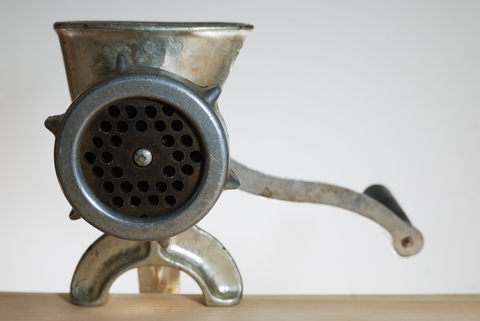Should You (or I) Self-Publish? Part One
I could always tell when Dad was going to make his four-hour spaghetti. He would haul out a metal contraption and bolt it to Mother’s bread board. Sporting primitive funnel and hand crank, it looked like a medieval torture device for dolls. Into the funnel Dad would drop onion wedges and celery stalks. Out of the bottom would slither glistening, pale green snakes.
Right now, that’s how my brain feels–my thoughts, like the onion and celery, twisted and inextricable.
The reason: I’ve been following the traditional vs. indie publishing debate. If you’re a writer, no doubt you have, too. And you’ve probably noticed there is no middle ground. There’s just the onion and the celery and the undecided.
I’ve been giving this so much thought these past few days in part because of a sobering blog post on the subject at Nail Your Novel. Even my subconscious entered the fray and now every night kindly wakes me up at 2 am to toss, turn, and ponder. I can tell you sleep deprivation messes with your writing!
I planned to merge the two camps (pro-traditional and pro-indie) into one post.
I failed. Where’s Dad’s food grinder when I need it? Collecting dust these many years.
Instead, we will look at the two sides separately. We’ll begin with traditional publishing–multi-layered like the onion.
First, the blog that started my mind whirring. Roz Morris of Nail Your Novel warns, “Indie publishing isn’t for people who couldn’t get published or represented. It’s for people who could.”
Egads! Sort of like when you go to the bank for a loan, but in order to score that loan, you must first prove you don’t need it. In other words, in order to be a successful self-publisher, you should have the product traditional publishers desire.
Talk about desire. Deep down I think many writers, maybe even most, yearn for that traditional contract with all the trimmings–or at least as many as have not been trimmed away by cost-cutting publishers. Award-winning author and editor Susan Mary Malone will tell you that “though POD radically changed the business, and everything now is pretty much going e-books, traditional publishing is still the gold standard, and being published by a recognized house remains the Holy Grail.”
The quest for that Holy Grail is fueled by the one clear advantage of traditional publishers–support backed by distribution. And with that comes validation. And open doors and coveted reviews. Roz Morris explains that indies “are still regarded sniffily in most quarters.” (Irrelevant aside: When I write, I avoid -ly adverbs, but I couldn’t help admiring how spiffily Roz uses sniffily. Indeed, this may be my first encounter with the word sniffily, and I love it. You know the adage: a writer can break any rule she can get away with.)
So, what do you think? Traditional publishing–Holy Grail or cement boots?
Tune in for the next installment of Writer Unleashed for a discussion of the agent-author-traditional publisher triad. And after that, self-publishing. The celery.

3 thoughts on “Should You (or I) Self-Publish? Part One”
Holy insomnia! Sorry to cause trouble…
No, it’s all good. Sometimes the mental light bulb goes on at 2 am.
I had to laugh at your analogy about proving to the bank you don’t need a loan in order to get one. Why, I wonder, is the truth so laughably (an “ly” word, sorry, but had to use it) true? Sad but true. (sigh) I agree that if you want to be a successful self-published author, then you best offer books of quality (polished with some serious editing and written well). But just because an author couldn’t get a book contract doesn’t mean she (or he) isn’t worthy of one! The so called “gatekeepers” have to make snap decisions on what books they want to back and who is to say the frazzled assistants mucking through the slush have the best opinion to decide? When you query, you are basically seeking the approval of one person. The hope is to find the one person who likes your story. Going the way of the Indie, at least you now are seeking the opinion of countless others (readers no less!). So why not reach out to them? I say this: if you self-publish and prove yourself as a writer, the traditional publishing opportunities will come. You’ve proved you don’t need them, so now you have a chance at getting them! It’s a strange world in which we live.